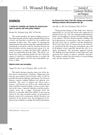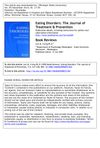 November 2016 in “Elsevier eBooks”
November 2016 in “Elsevier eBooks” Genetic mutations can affect female sexual development, requiring personalized medical care.
 June 2016 in “CRC Press eBooks”
June 2016 in “CRC Press eBooks” Sleep problems and skin issues affect each other; poor sleep can worsen skin conditions, and some skin treatments can improve or harm sleep quality.
 January 2016 in “Springer eBooks”
January 2016 in “Springer eBooks” The conclusion is that using the 5W1H method can improve diagnosis and management of childhood hair-pulling disorder.
 February 2003 in “Journal of Cutaneous Medicine and Surgery”
February 2003 in “Journal of Cutaneous Medicine and Surgery” Fine hairs improve male pattern baldness treatment, alopecia areata causes remain unknown, and hair can recover from dye damage over time.
 December 1999 in “Eating Disorders”
December 1999 in “Eating Disorders” Both books are useful for professionals, but "Exacting Beauty" is more comprehensive and practical.
 34 citations,
May 2017 in “Seminars in Reproductive Medicine”
34 citations,
May 2017 in “Seminars in Reproductive Medicine” Women with PCOS have a higher risk of diabetes, heart problems, certain cancers, and mental health issues, but early treatment can help manage these risks.
 25 citations,
January 2015 in “Advances in Psychosomatic Medicine”
25 citations,
January 2015 in “Advances in Psychosomatic Medicine” Many skin patients also have mental health issues, and doctors should treat both together.
 16 citations,
December 2006 in “Expert Review of Dermatology”
16 citations,
December 2006 in “Expert Review of Dermatology” Hair follicles are essential for skin health, aiding in hair growth, wound healing, and immune function.
 8 citations,
January 2020 in “Plastic and Aesthetic Nursing”
8 citations,
January 2020 in “Plastic and Aesthetic Nursing” The article concludes that different types of hair loss require specific treatments and psychological support is important.
 2 citations,
March 2001 in “Environmental Health Perspectives”
2 citations,
March 2001 in “Environmental Health Perspectives” Small hormonal imbalances can cause significant health problems, so more sensitive testing for hormone-disrupting chemicals is needed.
 June 2011 in “The Journal for Nurse Practitioners”
June 2011 in “The Journal for Nurse Practitioners” Up to half of adult women may experience hair loss, and doctors should use medical history, exams, and tests to find the cause and treat it.
46 citations,
July 2007 in “Journal of the American Academy of Dermatology” Alopecia areata causes significant emotional distress, including high rates of depression and anxiety.
 35 citations,
July 2015 in “Journal of Affective Disorders”
35 citations,
July 2015 in “Journal of Affective Disorders” Women with PCOS tend to have higher anxiety and depression levels compared to healthy women.
 4 citations,
January 2016 in “Postepy Dermatologii I Alergologii”
4 citations,
January 2016 in “Postepy Dermatologii I Alergologii” Many hair diseases, including those caused by medications and psychological issues, can lead to hair loss and require proper treatment and specialist care.
 4 citations,
November 2009 in “Medical Clinics of North America”
4 citations,
November 2009 in “Medical Clinics of North America” Stress, nutritional issues, and chronic diseases can cause hair loss, and nail changes may signal internal diseases; treatment focuses on the underlying cause.
October 2015 in “Vestnik dermatologii i venerologii” Alopecia significantly harms emotional and social well-being.
 30 citations,
September 2020 in “Journal of Patient-Reported Outcomes”
30 citations,
September 2020 in “Journal of Patient-Reported Outcomes” Alopecia Areata (AA) causes significant emotional distress, including feelings of embarrassment, depression, and anxiety, and impacts social interactions and daily activities.
 16 citations,
January 2006 in “The Aging Male”
16 citations,
January 2006 in “The Aging Male” Hormone imbalances can cause skin diseases, and understanding these links is important for diagnosis and treatment.
 5 citations,
April 2016 in “PubMed”
5 citations,
April 2016 in “PubMed” Young men with mild hair loss who experience significant social and emotional distress are more likely to have sexual problems.
 1 citations,
January 2014 in “Progress in Neurology and Psychiatry”
1 citations,
January 2014 in “Progress in Neurology and Psychiatry” Skin diseases can cause psychological issues, and better integration of dermatology and psychiatry is needed to improve patient care.
 August 2024 in “EMJ Dermatology”
August 2024 in “EMJ Dermatology” Non-scarring alopecia in females affects emotional well-being and requires accurate diagnosis and personalized treatment.
3 citations,
November 2021 in “Stress” Girls had higher stress hormone levels during school due to social and emotional issues, while boys had higher overall hormone levels with slight changes when school started.
 3 citations,
July 2012 in “British journal of hospital medicine”
3 citations,
July 2012 in “British journal of hospital medicine” The guide helps clinicians diagnose and manage hair loss, detailing examination techniques and treatments for different types of alopecia.
 1 citations,
January 2019 in “Paediatrics and Child Health”
1 citations,
January 2019 in “Paediatrics and Child Health” The document concludes that understanding hair biology and recognizing hair conditions are crucial for managing and treating hair loss in children.
Alopecia Areata causes hair loss and needs treatments that address both physical and emotional health.
 January 2023 in “Brazilian Journals Editora eBooks”
January 2023 in “Brazilian Journals Editora eBooks” The document concludes that Passiflora incarnata may help with anxiety, healthcare workers need mental support, common bacteria cause hospital UTIs, telehealth for heart failure needs research, kids' screen time has increased, pregnant teens are mostly okay with their body image, diagnosing post-surgery tuberculosis is hard, older and severely ill people are more likely to have long COVID symptoms, and psychiatrists should be part of pain management teams.
 January 2023 in “Brazilian Journals Editora eBooks”
January 2023 in “Brazilian Journals Editora eBooks” Passiflora incarnata may help with anxiety and sleep issues but has side effects; teleconsultation for heart failure can improve quality of life; increased screen time for children during the pandemic led to more clinical complaints; older and severely affected COVID-19 patients are more likely to have long-term symptoms.
 November 2020 in “Elsevier eBooks”
November 2020 in “Elsevier eBooks” Antiandrogens and androgen inhibitors like spironolactone, finasteride, and dutasteride can treat hair loss and skin conditions, but they have risks and side effects, including potential harm to pregnant women and risks of cancer and heart issues. Herbal remedies also have antiandrogenic effects but lack safety validation.
 September 2011 in “American Journal of Clinical Dermatology”
September 2011 in “American Journal of Clinical Dermatology” The birth control pill containing ethinylestradiol and chlormadinone may help treat acne and other skin and hair conditions related to hormones.
 150 citations,
October 2010 in “The American Journal of Pathology”
150 citations,
October 2010 in “The American Journal of Pathology” The document concludes that more research is needed to better understand and treat primary cicatricial alopecias, and suggests a possible reclassification based on molecular pathways.


























